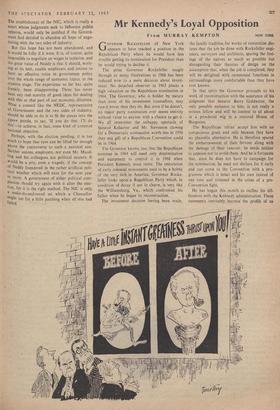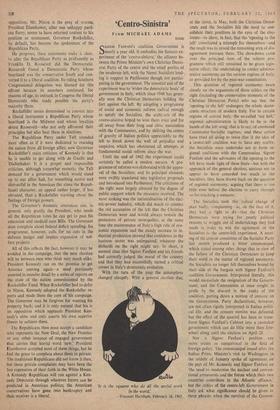Mr Kennedy's Loyal Opposition
From MURRAY KEMPTON
NEW YORK
GOVERNOR ROCKEFELLER Of New York appears to have reached a position in the Republican Party where he would have less trouble getting its nomination for President than he would trying to decline it.
be in 1964.
The Governor knows, too, that the Republican nominee in 1964 will need only determination and equipment to control it in 1968 when President Kennedy must retire. The restoration of early colonial monuments used to be a hobby of the very rich in America; Governor Rocke- feller looks upon a Republican Party which, in condition of decay if not in charm, is very like the Williamsburg, Va., which confronted his father when he began its reconstruction.
The investment decision having been made, The prize Governor Rockefeller sought through so many frustrations in 1960 has been reduced now to a mere decision about invest- ment. No detached observer in 1963 places a high valuation on the Republican nomination in 1964. The Governor, who is bolder by nature than most of his investment counsellors, may rate it better than they do. But, even if he doesn't, no major party nomination ever seems entirely without value to anyone with a chance to get it. We all remember the unhappy -spectacle of Senator Kefauver and Mr. Stevenson clawing for a bemocratic nomination worth less in 1956 than any gift of a Republican Convention could
the family tradition for works of restoration glio., tates that the job be done with Rockefeller engi- neers, surveyors and architects, sparing the feel- ings of the natives as much as possible but disregarding their theories of design on the assumption that, when the job is completed, they will be delighted with ceremonial functions in surroundings more comfortable than they have ever known.
In that spirit the Governor proceeds to his work of reconstruction with the assurance of his judgment that Senator Barry Goldwater, the only possible nuisance to him, is not really a serious fellow and will be content to sit about in a powdered wig in a restored House of Burgesses.
The Republican 'ultras' accept him with no conspicuous grace and only because they have no plausible alternative. He is therefore spared the embarrassment of their fervour along with the damage of their rancour; he needs neither to appease nor to avoid them. And he is fortunate that, since he does not have to campaign for the nomination, he need not declare for it early and can come to the Convention with a pro- gramme which is intact and his own instead of one torn and trimmed in the crises of a pre- Convention fight.
He has begun this month to outline his dif- ferences with the Kennedy administration. These statements inevitably become the profile of an opposition; Mr. Nixon is the prey of worms; President Eisenhower, after one unhappy parti- san flurry, seems to have returned content to his position as monument. Governor Rockefeller, by default, has become the spokesman of the Republican Party.
He proposes, these statements make it clear, to alter the Republican Party as profoundly as Franklin D. Roosevelt did the Democratic. Roosevelt found a Democratic Party whose heartland was the conservative South and con- verted it to a liberal coalition. Its ruling Southern Congressional delegation was blamed for this affront because its members continued, for reasons of age, to outrank in Congress the liberal Democrats who made possible the party's majority there.
Rockefeller seems determined to convert into a liberal instrument a Republican Party whose heartland is the Midwest and whose loyalties detest Roosevelt—who not only affronted their principles but also beat them in elections.
The Republican Party under Taft sounded most often as if it were dedicated to rescuing the nation from all foreign allies; now Governor Rockefeller's main criticism of Kennedy is that he is unable to get along with de Gaulle and Diefenbaker. It is a proper and responsible criticism, although somewhat esoteric; the Taft demand for a government which would stand up to our allies had, for something native and distrustful in the American (let alone the Repub- lican) character, an appeal rather larger, if less elevated, than a Rockefeller warning about the feelings of foreign powers.
The Governor's domestic utterances can, in general, only gratify the President, who needs all the Republican votes he can get to pass his education and medical care Bills. The Governor does complain about federal deficit spending; his programme, however, calls for no cuts in the defence budget and implies expansion of wel- fare projects.
All of this reflects the fact, however it may be avoided in the campaign, that the next election will be between men who think very much alike. President Kennedy ran on the promise to get America moving again—a need previously asserted in massive detail by a series of reports on the state of the nation commissioned by the Rockefeller Fund. When Rockefeller had to defer to Nixon, Kennedy adopted the Rockefeller re- ports and made them the core of his campaign. The Governor may be forgiven for wanting his property back; and it is only natural that his is an opposition which applauds President Ken- nedy's aims and only asserts his own superior fltneis to achieve them.
The Republicans then must accept a candidate who represents the New Deal, the New Frontier or any other instance of engaged government that carries that horrid word `new.' President Eisenhower accepted most of these things, but he had the grace to complain about them in private.
The traditional Republicans did not know it then, but those private complaints may have been the last expression of their faith in the White House.
A Kennedy Republican will run against a Ken- nedy Democrat through whatever future can be predicted in American politics; the American conservatives have gone into bankruptcy and their receiver is a liberal.



































 Previous page
Previous page